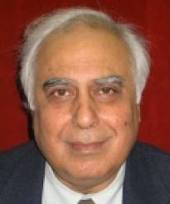 As the first ever high-level Indo-US education summit gets underway, India on Wednesday pitched for famed American universities to 'reach out' to the country, with the visiting minister Kapil Sibal saying that tie-ups would yield high economic returns.
As the first ever high-level Indo-US education summit gets underway, India on Wednesday pitched for famed American universities to 'reach out' to the country, with the visiting minister Kapil Sibal saying that tie-ups would yield high economic returns.
Making a strong case for US institutions of higher education to partner with those in India, the Minister for Human Resource Development said it is time that the US institutes of higher learning realise that the 'way to move forward in education is to come to India, to collaborate and set up institutions and reach out to people.'
He, however, added that India too has to 'reach out' and create an environment for US universities to set up base in the country.
"You have a higher education structure which is the envy of the world, it has been at the front of all knowledge creation.
"US has the best academics all over the world. It is time for you to reach out, collaborate with us because in that process you will participate in not just helping us solve our problems but helping us solve the problems of the world," he said at an event on India-US education opportunities organised by the Centre for Strategic and International Studies in Washington.
The day-long education summit on October 13, to be co-chaired by Sibal and Secretary of State Hillary Clinton, will see participation by over 300 higher education leaders, government and private sector representatives.
Sibal pointed out that investing in the Indian education sector makes good economic sense for the US as the return on investment in India is much higher as compared to any other country.
"Your model that kids should fly across the Atlantic to go to Harvard, Stanford or Yale is not a good economic model because your investment per dollar gives you a very small return.
"The same investment in India in collaboration with an Indian institution will give you much higher return," Sibal said.
While only 100,000 Indian students are currently studying in the US, Sibal said India has over 200
"So instead of having 200,000 people come to the US, you can actually with the same money empower a million kids in India. There is need to change the mindset of people in the education sector."
To address the education needs of the young in India, the country would need another 1000 universities and 55,000 colleges in the next 10 years when the number of children going to college increases from the current 16 million to 45 million.
"India cannot build 1000 universities on its own. So we will perforce have to create an environment in which private sector investment, foreign direct investment and public-private partnership will be channelled into the education sector."
The mindset of the Americans that students should come to the US to study is the 'wrong way of going about it' because the global economy and solutions are not going in that direction.
Capital flow will not be directed to developed economies, which have reached saturation point, Sibal said, adding that capital will flow to countries with opportunities.
"There are opportunities galore in India in every part of its economy, be it infrastructure or education" and billions of dollars of investment is projected to be made in these sectors.
Sibal further added that if 200 million children in India do not get an opportunity to go to college or have jobs then the 'prospects of what they are likely to do are mind-boggling and frightening.'
Apart from imparting education, it has to be ensured that a large part of the potential workforce of the world is empowered so that they can be 'fruitfully' employed.
Sibal said as the world grapples with problems of climate change, poverty and food security, technology and research will play a key role in finding solutions to these problems.
As the centre of economic activity shifts to Asia, solutions to these problems must also happen in Asia, especially in India and China, which are home to about a third of the world population, he added.
Image: Kapil Sibal









